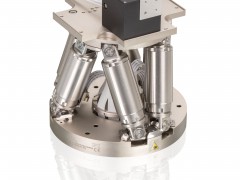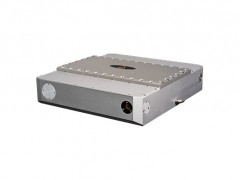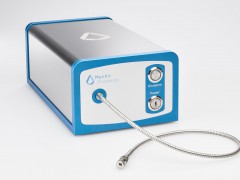
Pulsed Laser Irradiation Enhances Antibacterial Properties of Nanoplates
source:Photonics
release:Nick
keywords: Pulsed Laser Irradiation Silver nanoparticles AgNPs
Time:2017-11-30
KUMAMOTO, Japan, Nov. 29, 2017 — When gold-coated silver nanoparticles are irradiated with a pulsed laser, the heat from the laser enables silver ions to escape through the gold coating, thus preserving the strong antibacterial effect of the silver.
Silver nanoparticles (AgNPs) are known to have antibacterial properties; but they also have a propensity to conglomerate, which reduces their antibacterial attributes. Researchers at Kumamoto University addressed the conglomeration issue by coating silver nanoparticles with gold. The gold coating eliminated conglomeration. However, it also lessened the antibacterial attributes of the silver nanoparticles, because the silver was no longer exposed. This prompted the team to investigate methods for retaining the shape of the nanoparticles as well as their antibacterial properties.
Researchers irradiated the gold-coated silver nanoparticles (Ag@AuNPs) with a pulse laser and found that the heat from the laser caused the morphology of the nanoparticles to change from a triangular plate to a spherical shape. The team showed that Ag@AuNPs were about equal parts triangle and sphere before irradiation but became 94 percent spherical after irradiation. The team further showed that the silver-to-gold ratio of the pre-irradiation Ag@AuNPs was around 22:1, but the post-irradiation ratio was around 4.5:1. Researchers attributed this change to the generation of defects in the gold-coating, which enabled some of the silver to escape as ions. The release of the silver produced a bactericidal effect.

When gold-coated silver nanoplates are irradiated with a pulsed laser, they change shape into a sphere and release silver ions which produces a strong antibacterial effect. Courtesy of Dr. Takuro Niidome.
The irradiated Ag@AuNPs were found to be highly effective against Escherichia coli, resulting in a zero percent colony survival rate. Silver nanoparticles alone were similarly effective, but the Ag@AuNPs could be activated as needed and did not show a tendency to coalesce like the silver nanoparticles did.
“We have developed a method to activate the antibacterial properties of silver nanoparticles at will,” said professor Takuro Niidome. “Our experiments have shown that, while nonirradiated gold-coated silver nanoparticles have only minor antibacterial properties, the effects are significantly increased after pulsed laser irradiation. We hope to develop this technology further as a method of managing bacteria that have developed antibacterial resistance.”
Silver nanoparticles (AgNPs) are known to have antibacterial properties; but they also have a propensity to conglomerate, which reduces their antibacterial attributes. Researchers at Kumamoto University addressed the conglomeration issue by coating silver nanoparticles with gold. The gold coating eliminated conglomeration. However, it also lessened the antibacterial attributes of the silver nanoparticles, because the silver was no longer exposed. This prompted the team to investigate methods for retaining the shape of the nanoparticles as well as their antibacterial properties.
Researchers irradiated the gold-coated silver nanoparticles (Ag@AuNPs) with a pulse laser and found that the heat from the laser caused the morphology of the nanoparticles to change from a triangular plate to a spherical shape. The team showed that Ag@AuNPs were about equal parts triangle and sphere before irradiation but became 94 percent spherical after irradiation. The team further showed that the silver-to-gold ratio of the pre-irradiation Ag@AuNPs was around 22:1, but the post-irradiation ratio was around 4.5:1. Researchers attributed this change to the generation of defects in the gold-coating, which enabled some of the silver to escape as ions. The release of the silver produced a bactericidal effect.

When gold-coated silver nanoplates are irradiated with a pulsed laser, they change shape into a sphere and release silver ions which produces a strong antibacterial effect. Courtesy of Dr. Takuro Niidome.
The irradiated Ag@AuNPs were found to be highly effective against Escherichia coli, resulting in a zero percent colony survival rate. Silver nanoparticles alone were similarly effective, but the Ag@AuNPs could be activated as needed and did not show a tendency to coalesce like the silver nanoparticles did.
“We have developed a method to activate the antibacterial properties of silver nanoparticles at will,” said professor Takuro Niidome. “Our experiments have shown that, while nonirradiated gold-coated silver nanoparticles have only minor antibacterial properties, the effects are significantly increased after pulsed laser irradiation. We hope to develop this technology further as a method of managing bacteria that have developed antibacterial resistance.”
MOST READ
- RoboSense is to Produce the First Chinese Multi-beam LiDAR
- China is to Accelerate the Development of Laser Hardening Application
- Han’s Laser Buys Canadian Fiber Specialist CorActive
- SPI Lasers continues it expansion in China, appointing a dedicated Sales Director
- Laser Coating Removal Robot for Aircraft
PRODUCTS
 FISBA exhibits Customized Solutions for Minimally Invasive Medical Endoscopic Devices at COMPAMED in
FISBA exhibits Customized Solutions for Minimally Invasive Medical Endoscopic Devices at COMPAMED in New Active Alignment System for the Coupling of Photonic Structures to Fiber Arrays
New Active Alignment System for the Coupling of Photonic Structures to Fiber Arrays A new industrial compression module by Amplitude
A new industrial compression module by Amplitude Menhir Photonics Introduces the MENHIR-1550 The Industry's First Turnkey Femtosecond Laser of
Menhir Photonics Introduces the MENHIR-1550 The Industry's First Turnkey Femtosecond Laser of Shenzhen DNE Laser introduced new generation D-FAST cutting machine (12000 W)
more>>
Shenzhen DNE Laser introduced new generation D-FAST cutting machine (12000 W)
more>>
